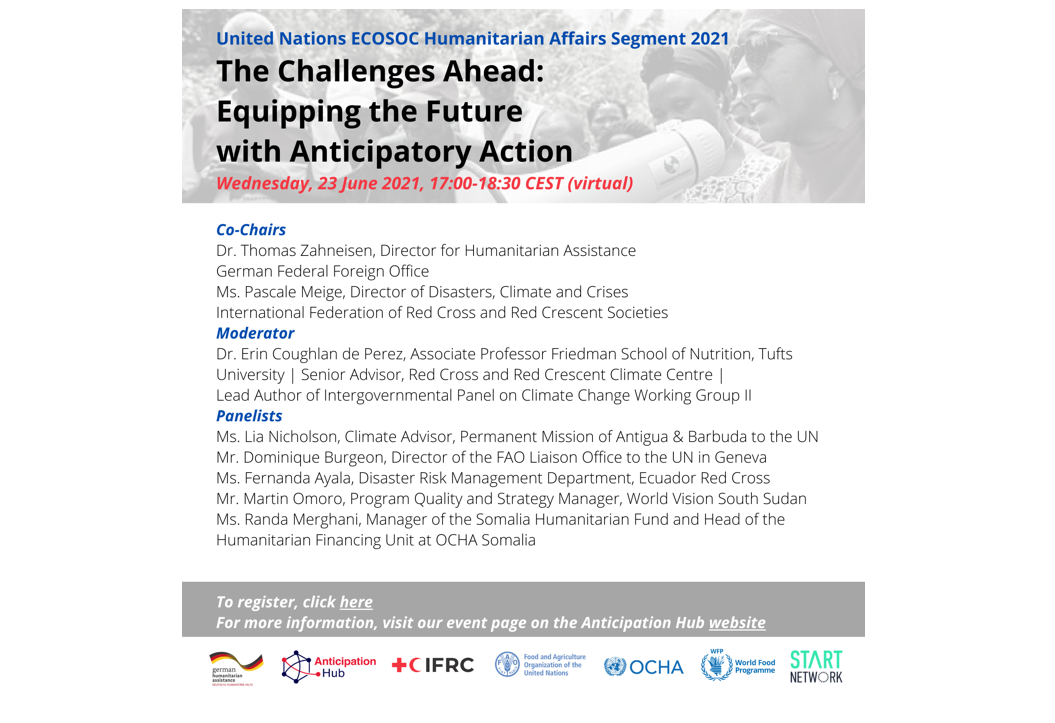2021 ECOSOC Humanitarian Affairs Segment (HAS) Side Event
The Challenges Ahead: Equipping the Future with Anticipatory Action
This is one of the virtual side-events to be convened on the margins of the Economic and Social Committee (ECOSOC) Humanitarian Affairs Segment (HAS), which builds on this year’s HAS theme: “Strengthening humanitarian assistance to face the challenges of 2021 and beyond: mobilizing respect for international humanitarian law, inclusion, gender, innovation and partnerships”.
Background and Objectives of the side event
The number of people exposed to climate-related hazards is drastically increasing, causing cascading humanitarian, social, economic and political impacts around the globe. According to the IFRC’s World Disasters Report 2020, 83% of all disasters in the last decade were caused by climate- and weather-related disasters, such as floods, storms, and heatwaves. Since the 1990s, climate-related disasters have risen in frequency by almost 35% and impacted over 1.7 billion people around the world.
The IFRC’s Cost of Doing Nothing Report predicts that by 2050, 200 million people every year could need international humanitarian aid due to climate-related disasters and their impacts, costing more than $20 billion per year in additional humanitarian aid.
Most recently, the Anticipatory Action Task Force consisting of IFRC, WFP, Start Network, FAO, and OCHA have been shifting their humanitarian response and investing in anticipatory action, from waiting and then reacting to a disaster to acting ahead of them, all of which protects diverse, vulnerable, and marginalised communities and finite resources. To date, anticipatory action initiatives are being successfully implemented by these organisations in over 60 countries and have helped drive significant policy achievements that are building global momentum to scale up anticipatory action, including the G7 Famine Compact and ECHO Guidance note on Disaster Preparedness and have developed key policy asks for anticipatory action.
Anticipatory action needs to be part of a system-wide shift and this work must be driven by local actors, who especially focus on vulnerable communities. Additionally, more effort is required to make anticipatory action applicable to a wider variety of natural and human-induced hazards, shocks and compounding risks. The COVID-19 pandemic has amplified this need to assess and anticipate compounding risks and the associated cascading impacts, looking beyond hydro-meteorological hazards to include other shocks such as pandemics, disease outbreaks, pests and the impacts of armed conflict, and violence such as displacement.
While significant progress has been made over the last five years, we know what works and now is the time to critically reflect on the challenges to tackle the escalating hazards, shocks and compounding risks expected by 2050, to evaluate the opportunities of anticipatory action, and to identify how we can further scale-up, mainstream and adapt the approach to be fit for our changing future world.
The objectives of the side event are to:
- Critically reflect on the progress by the key agencies implementing anticipatory action (Anticipatory Action Task Force, who consist of IFRC, WFP, Start Network, FAO and OCHA).
- Assess how actors can be ready for the intertwined climate and humanitarian challenges ahead in 2050.
- Explore the ways we can further scale up anticipatory action measures for the future.
Co-chairs:
- Dr. Thomas Zahneisen, Director for Humanitarian Assistance, German Federal Foreign Office
- Ms. Pascale Meige, Director of Disasters, Climate and Crisis, International Federation of Red Cross and Red Crescent Societies
Moderator:
- Dr. Erin Coughlan de Perez | Associate Professor Friedman School of Nutrition, Tufts University |Senior Advisor, Red Cross Red Crescent Climate Centre | Lead Author of Intergovernmental Panel on Climate Change Working Group II
Panel Composition
- Ms. Lia Nicholson, Climate Advisor, Permanent Mission of Antigua & Barbuda to the UN
- Mr. Dominique Burgeon, Director of the FAO Liaison Office to the UN in Geneva
- Ms. Fernanda Ayala, Disaster Risk Management Department, Ecuador Red Cross
- Mr. Martin Omoro, Program Quality and Strategy Manager, World Vision South Sudan
- Ms. Randa Merghani, Manager of the Somalia Humanitarian Fund and Head of the Humanitarian Financing Unit at OCHA Somalia
Title
ECOSOC HAS Side Event: The Challenges Ahead: Equipping the Future with Anticipatory Action
Sponsors
German Federal Foreign Office
International Federation of Red Cross and Red Crescent Societies (IFRC)
Co-organisers
Anticipation Hub and Anticipatory Action Task Force [(Food and Agriculture Organization (FAO), IFRC, OCHA (Office for the Coordination of Humanitarian Affairs), Start Network and World Food Program (WFP)]
Date
Wednesday, 23 June 2021
Time
5 pm - 6:30 pm (Geneva time)
Registration
Register for the Zoom Meeting here
More information
Visit the ECOSOC HAS website here.
Download the flyer here.


